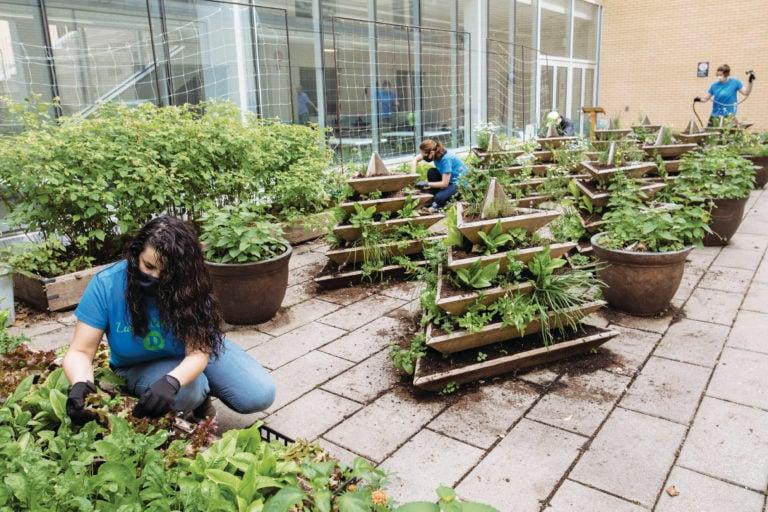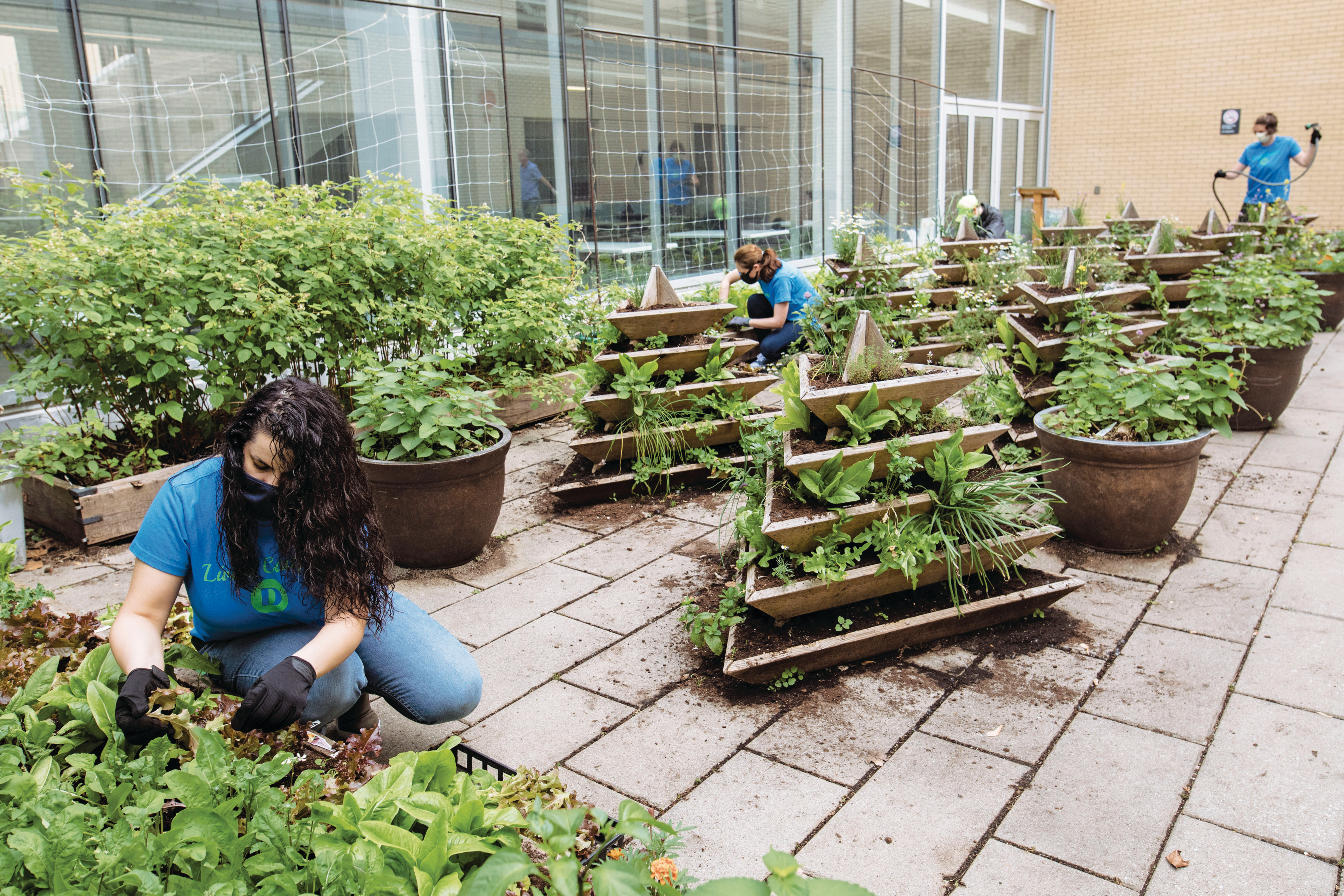In a climate-anxious world, these colleges are training students to fight back
Colleges are hearing—and heeding—the call from students who want to make a more livable world and employers that are embracing sustainability

Dawson College students harvest greens at one of the many gardens on the Montreal campus (Dario Ayala)
Share

After one year at a suburban Montreal college, John Nathaniel Gertler switched to downtown Dawson College for its environmental program.
“Whatever I do has to involve making the planet a better place and a more livable place for more people,” says Gertler, 19, who is a member of Dawson’s student-run Earth Club and a climate change activist.
At Dawson, Gertler’s two-year environmental program—which offers streams in science or social sciences for university-bound students—incorporates sustainability themes in classroom lectures and offers various field trips, such as to a non-profit greenhouse that promotes community-based food security projects. When COVID-related travel restrictions aren’t in place, students have the option of a two-week trip to Costa Rica, where they stay with rural families to learn about everyday life and eco-tourism while exploring a country known for its biodiversity.
“Climate change threatens the future of the younger generation,” says Gertler, who chose Dawson’s social sciences stream. “In my mind, all schools should be fully invested in giving students the tools and the space to learn about it so they can fight against it.”
Colleges are hearing this message from students and employers and introducing new or revamped environmental programs, as well as commitments to reduce on-campus greenhouse gas emissions. Dawson, for example, has pledged a 60 per cent cut in greenhouse gas emissions from the late 1990s by 2021. The campus, home to several urban gardens, including on rooftops, serves as a “living lab” for research by students and faculty in areas such as food security and disease-free breeding of monarch butterflies.
“We know climate anxiety is really big with students and they are wondering about their future,” says Chris Adam, manager of Dawson’s sustainability office. This year, Adam joined a working group at Colleges and Institutes Canada whose members are identifying best practices to infuse sustainability into the curriculum and expand campus efforts to cut greenhouse gas emissions.
Some schools have been moving in this direction for a while.
Several years ago, Nova Scotia Community College (NSCC) introduced a “green” focus to programs at its 14 campuses across the province. “We have to take it to the next level,” says NSCC president Don Bureaux of the role of colleges in climate change. “We as an organization have to ensure that every one of our graduates is asking, ‘What kind of change agent do [I] want to be for a world that adopts and manifests a green agenda?’ ”
NSCC, which perennially earns high marks from the Association for the Advancement of Sustainability in Higher Education, offers a two-year diploma in energy sustainability engineering technology (ESET) at the school’s Annapolis Valley campus. Students learn to use analytic and modelling software applications and other equipment that promote reduced energy consumption and renewable energy sources. During a mandatory five-week work placement with government, private sector or non-profit employers, students apply classroom learning to real-life tasks, such as energy audits of conventional heating and lighting systems and implementation of sustainability measures in residential and commercial buildings.
“This is for people who are looking to enter a career where they are working directly on sustainability-related issues that address the climate change crisis,” says Anne Lombardi, faculty and program lead for the program. “It is a very real way to see real impact.”
Among those who hire regularly from the program is Efficiency One, a not-for-profit organization in Nova Scotia that encourages reduced energy consumption and renewable sources of power for residential and commercial buildings.
“Not a lot of institutions offer training and education in the area of energy efficiency, sustainability, green building practices and alternative energy,” says Stephen MacDonald, chief executive officer of Efficiency One. “To have a program like ESET specifically tailored to this work is hugely important to us.”
Energy-efficient buildings are major potential contributors to Canada achieving its pledge to reduce greenhouse gas emissions to 30 per cent below 2005 levels in 10 years. That means specialists in energy modelling, for example, will be essential to manage low-carbon “smart” buildings, says Jeff Ranson, regional director for the Greater Toronto Area of the Canada Green Buildings Council. “This is exciting, meaningful work.”
At colleges turning out graduates for the culinary and hospitality industry, the curriculum is also being revamped to address green issues, by minimizing food waste, for example, promoting healthy eating and redesigning supply chains for locally produced ingredients.
“When I was a student 20 years ago, we didn’t discuss sustainability and we didn’t ask where our food came from,” says Christine Walker, academic director of the Chef School at George Brown College in Toronto. “Our team now is very conscious of sustainability and always striving to embed it into the curriculum.”
The school partners with Ocean Wise, a conservation program that promotes ocean-friendly seafood choices. “Traditionally, chefs want to teach skills that are based on specific products,” such as cooking an imported fish instead of one caught locally, says Walker. “It’s a big shift to get chefs to teach the same skills for a product that is in season and sustainable.” Two years ago, the school’s Centre for Hospitality and Culinary Arts earned a Canadian food service industry LEAF certification for its student-run restaurant that reduces waste from food and water, cuts excess packaging and curbs transportation emissions. Walker says the school plans to introduce a four-year degree in food studies that will feature “a strong mandate for sustainability from all angles.”
At Vancouver’s British Columbia Institute of Technology (BCIT), the School of Construction and the Environment overhauled its two-year environmental engineering program three years ago after surveying students, faculty and industry. “In our revamped program, we are making sure that principles of sustainability are woven into each course,” says program head Olga Petrov. Through classroom and hands-on projects, students learn to sample air, soil and groundwater quality, design mathematical models for environmental impact assessments and develop oral and written skills to convey technical information in layperson’s terms.
Prospective students require a diploma or bachelor’s degree in engineering, science or natural resource management, and graduate with a technology degree in environmental engineering that addresses all aspects of the environment—air, water, soil and energy—not just one area, as in other programs.
“This program gives them the next step in a very diverse set of skills that employers are looking for,” says Andrew MacKay, senior manager and partner of Envirochem Services Inc., a Vancouver consulting firm that hires from BCIT’s program. Today’s graduates need more than narrow expertise and a singular focus on profits, he says. “You need to have a broader sense of purpose and what defines success.”
This article appears in print in the Maclean’s 2020 Canadian Colleges Guidebook with the headline, “When green is all there is to be.” Order a copy of the issue here. Subscribe to the monthly print magazine here.